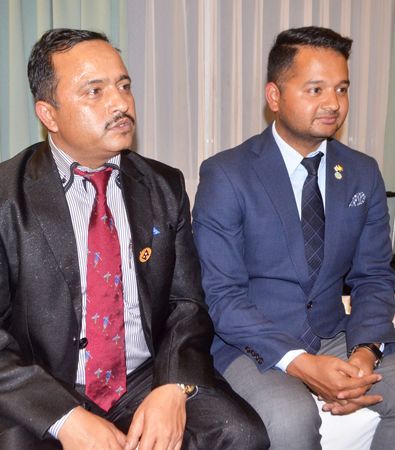Government authorized organization conducts survey on sexual harassment damage to students from Nepal

On January 5 at a hotel in Naha City, Non-Resident Nepali Association (NRNA) Japan Chapter Vice President Tanka Prasad Gaire (left) and General Secretary Anuj Thapa visited Okinawa for the investigation.
January 6, 2017 Ryukyu Shimpo
Allegations that Nepalese international students attending Japanese language schools and a vocational school in Okinawa are being sexually harassed has been spread by Social Networking Sites (SNS) since the end of the last year, causing concern in Nepal. Some parents in Nepal are worried and are encouraging students to return home. The Nepalese government-authorized private organization “Non-Resident Nepali Association (NRNA)” Japan Chapter’s Vice President Tanka Prasad Gaire and General Secretary Anuj Thapa visited Okinawa on the 5th and started investigating the situation, visiting three Japanese language schools.
According to the Japan Chapter, last December an online news article from “NepalJapan.com” used by Nepalese in Japan reported a student testimony. One of three nationwide newspapers in Nepal also reported it.
It is the first time the Chapter has investigated claims of students being sexually harassed in Japan. The survey investigated rumors among international students that female students are being targeted, but the victims have not been identified. They conducted interviews with international students on the 6th.
According to Nepal’s report, the school held on to residence cards which students are required to carry with them. Schools and international students responded to the survey, stating that this was the case in the past, but not now.
The survey also looked at the issue of foreign students exceeding the part-time job limit of 28 hours a week, stressing that the law must be observed, but pointing out that the high cost of school tuitions and dormitory expenses leads to students seeking to work extra hours.
They went to on to say that neither the schools nor the immigration bureau have tried to solve the problem as far as they know.
Thapa also questioned the method of recruiting students to the Japanese language schools. He said, “Schools cannot run without students. Schools just collect the number of students they want and leave the responsibility (of living in Japan) to students. It has become a business.”
NRNA has 68 chapters all over the world. In Japan, there are 12 branches including the Okinawa branch.
(English translation by T&CT and Megumi Chibana)
Previous Article:Local karate dojos hold first training of the year against background of World Heritage Site Katsuren Castle Ruins
Next Article:Ryukyu Shimpo survey reveals 35% of Okinawans favor increased autonomy, less than half support status quo
[Similar Articles]
- Nepalese students hold memorial service to pray for homeland
- Okinawan municipalities conduct Japanese language assistance for students with foreign citizenship
- OPG publishes book to help elementary and junior high students learn Shimakutuba
- 30% of high school teachers notice students financially in trouble
- 90 percent of students in Miyako Island not using local dialect
 Webcam(Kokusai Street)
Webcam(Kokusai Street)


